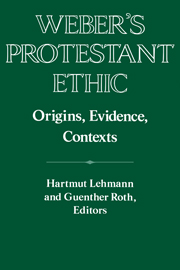Book contents
- Frontmatter
- Introduction
- Part I Background and Context
- 1 The German Theological Sources and Protestant Church Politics
- 2 The Thesis before Weber: An Archaeology
- 3 Max Weber, Protestantism, and the Debate around 1900
- 4 Weber the Would-Be Englishman: Anglophilia and Family History
- 5 Weber's Historical Concept of National Identity
- 6 Nietzsche's Monastery for Freer Spirits and Weber's Sect
- 7 Weber's Ascetic Practices of the Self
- 8 The Protestant Ethic versus the “New Ethic”
- 9 The Rise of Capitalism: Weber versus Sombart
- Part II Reception and Response
- Index
6 - Nietzsche's Monastery for Freer Spirits and Weber's Sect
Published online by Cambridge University Press: 05 January 2013
- Frontmatter
- Introduction
- Part I Background and Context
- 1 The German Theological Sources and Protestant Church Politics
- 2 The Thesis before Weber: An Archaeology
- 3 Max Weber, Protestantism, and the Debate around 1900
- 4 Weber the Would-Be Englishman: Anglophilia and Family History
- 5 Weber's Historical Concept of National Identity
- 6 Nietzsche's Monastery for Freer Spirits and Weber's Sect
- 7 Weber's Ascetic Practices of the Self
- 8 The Protestant Ethic versus the “New Ethic”
- 9 The Rise of Capitalism: Weber versus Sombart
- Part II Reception and Response
- Index
Summary
The concept of “elective affinity” is particularly useful in discussing Nietzsche and Weber, and it has been chosen deliberately because it leaves open the question of causality that has recently been discussed so much in the literature. In searching for elective affinities, I would like to use Weber to demythologize Nietzsche. Looking for such affinities implies comparison, and comparing Nietzsche means relativizing his uniqueness. Both Weber and Nietzsche developed ideal types of “sect” and “monastery,” and both were concerned with the process of self-education that produces “strong natures ” (“free thinkers”) or “personalities” (rationalistic “supermen”), in essence, exemplary religious individuals. But they also differed very much methodologically, and Weber’s Sachlichkeit threatens Nietzsche's position. The differences are well known, but they become ever clearer when we look at issues and concepts of Nietzsche's generation and that of his teachers. I would like to follow here Montinari's suggestion by attempting to reconstruct part of Nietzsche's “ideal library” and to present “the contemporaries with whom he engaged in argument as well as his ties to individuals and groups of his time.” Although this brings out the great difference from Weber, it also moves, surprisingly, figures like Jhering, Tonnies, and Simmel closer to Nietzsche and, for all their differences, places them in a paradigm that asserts a successful union of the natural sciences and the humanities in the study of language, at least for the period in question.
- Type
- Chapter
- Information
- Weber's Protestant EthicOrigins, Evidence, Contexts, pp. 133 - 160Publisher: Cambridge University PressPrint publication year: 1993
- 1
- Cited by

